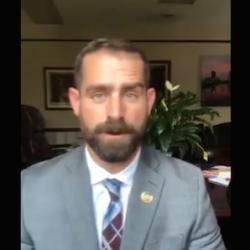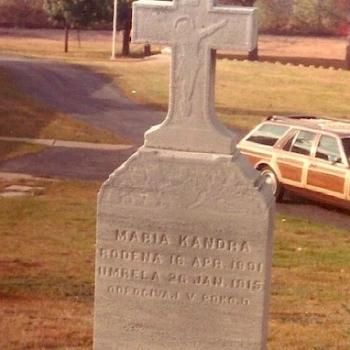Is there any scripture passage more familiar than that reading from Paul’s letter to the Corinthians?
You hear that passage all the time at weddings. I know it was read at my wedding. It’s been used at funerals – most famously, perhaps, at the funeral for Princess Diana, where it was read by Tony Blair. When he was sworn in as president, Franklin Roosevelt had his family Bible opened to that chapter. He rested his hand on words that proclaim and define the meaning of love.
We hear it so much, we feel as if we know it.
But do we? Like love itself, this passage is often misunderstood.
In the year 56, when Paul was writing, the church in Corinth was a mess. There was feuding and factions and finger-pointing. The early church was full of dissension and disagreement.
But Paul wrote this letter to tell them: we are better than this. There is “a more excellent way.”
He wanted them to know that being a Christian means, quite simply, to love.
It was something that the Greeks called “agape.” Sacrificial giving. Charity. That is the love Paul was describing.
And it is a love the world is hungry for, especially today.
I still remember the email I got several years ago from a deacon I know in Atlanta. He wanted to share with me some news.
He and his wife had heard about an 18-month-old baby boy named Matthew. He was the grand-nephew of a friend of theirs, and he was born without kidney function. The deacon’s wife, Marie, underwent surgery and donated her kidney to this little boy whom she barely knew and wasn’t even related to.
That was remarkable enough. But there was another detail that the deacon wanted me to know about.
“The problem that caused Matthew to not have kidney function,” he wrote, “was detected prior to his birth. The OB/GYN encouraged his mother to have an abortion. She refused.”
The rest is history. Living history. Mother, and child, and Marie, the donor, are all doing well.
And now, Matthew lives. Because of this extraordinary act of love.
Love is about giving yourself away. But we’ve forgotten that. We hold back. We don’t want the unplanned or the unexpected. We seek control. We terminate what is inconvenient or difficult or somehow not what we want—even, too often, another life.
Just look at what just happened in our own state of New York.
Look what is beginning elsewhere around the country. Our lawmakers literally cheer legalized murder.
They gave it a standing ovation in Albany and lit up skyscrapers in celebration of an evil that has been condemned since the earliest days of recorded history.
Worse than a scandal, this is a tragedy — a social, moral and spiritual tragedy.
We have come to justify and legitimize what was once unthinkable and abhorrent.
In a stunning irony, the first words we heard from scripture today came from Jeremiah:
“Before I formed you in the womb I knew you,
before you were born I dedicated you.”
God has a hand in every life — and yet again and again, we reach out to rip that life from his hands.
What are we doing?
The tragedy is not just that we have lost the value of life. We have lost, somehow, the value of love. And we have turned our backs on the very message of the Gospel: to care for the smallest, the weakest, the poorest, “the least of these.”
Yet every now and then, you hear stories like the one about Marie and Matthew, and the message still comes through.
The message that reminds us we are better than this. The message of “a more excellent way.”
It is one we need more urgently today, especially in the divisive and divided days we live in. The times are often downright toxic, and the media doesn’t help. Visit Facebook or Twitter or the comment section of any newspaper and you will behold a culture of hate — an adjunct of the culture of death, where people rain down rage on those they disagree with and automatically assume the worst of everyone, often for the most superficial of reasons.
Our response needs to be “No.” St. Paul says to us today as he said to the people of Corinth 2,000 years ago: no.
We are better than this.
There is a more excellent way.
It is to bear all things, endure all things, hope all things. It is to love.
But that is just the beginning—and it is a challenge even for the best of us.
It is to love not only those we know, but those we don’t.
To love not only those we like, but those we dislike.
To love not only those we agree with politically, but those we don’t.
It means: To love our enemies and pray for our persecutors.
This is the way of love. The way of Christ.
We who follow him can do no less.
Read that passage from Corinthians and you realize: this is not only what it means to be Christian. This is what it means to be Christ. This is what it means to open your arms for another and bleed for another and die for another.
This is agape. This is love.
We have so far to go.
But let this be our prayer: that we begin the journey, to walk this way of love as a people, as society, as a nation.
Pray that our leaders come to renounce death and respect life. All life, at every moment of life.
Pray that we love those we would rather hate — and uplift in prayer and in hope those we would rather condemn or mock.
Pray that all of us remember the words of St. Paul and make them our own — not just this Sunday, but every day.
Because we are better than this.
A New York priest by the name of Father John Jay Hughes reflected on this passage from Corinthians recently and made a connection so many of us miss. This is what Paul was talking about, his central message to a wounded world.
I want to leave you with these words of Father Hughes—words that help us to hear this most familiar and recognizable part of scripture in a new way.
Think of this as you come forward to receive Christ in the Eucharist. Think of who we are receiving — and what this means for all of us.
This is for anyone tempted to anger or despair, to hate or revenge. In short, they are words for all of us: words of mercy and tenderness and hope.
They underscore the simple reality: that God is love.
“True love,” Father Hughes wrote, “is a person. His name is Jesus Christ.”
And he explained what we so often forget, the ultimate answer to the timeless question, “What Would Jesus Do?”
“Jesus,” he wrote, “is patient, Jesus is kind. He is not jealous, he is not pompous, he is not inflated, he is not rude, he does not seek his own interests, he is not quick-tempered, he does not brood over injury. Jesus does not rejoice over wrongdoing but rejoices with the truth. Jesus bears all things, believes all things, hopes all things, endures all things.
Jesus never fails.”














